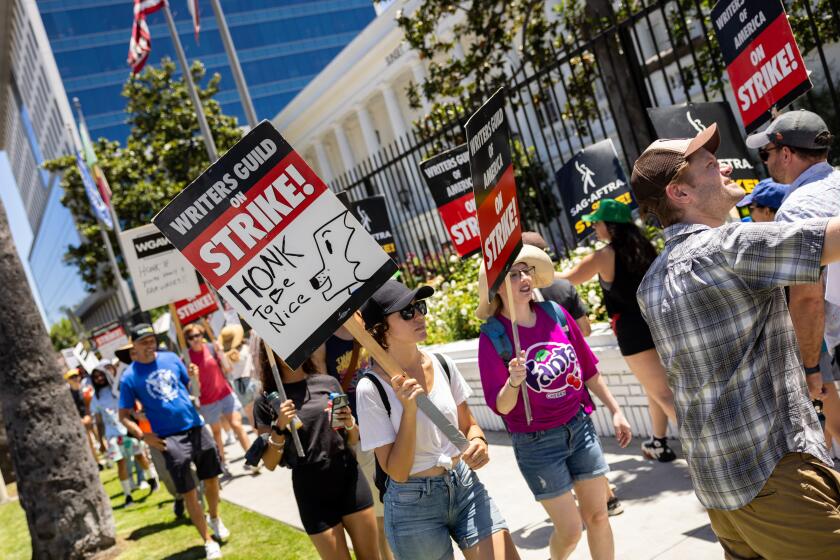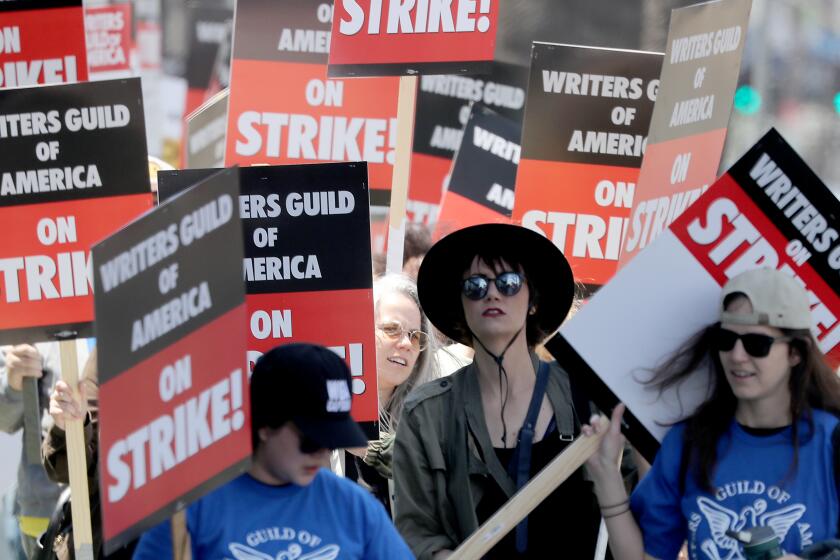Hollywood strike and High Holy Days: L.A. Jews seek solace amid tough times
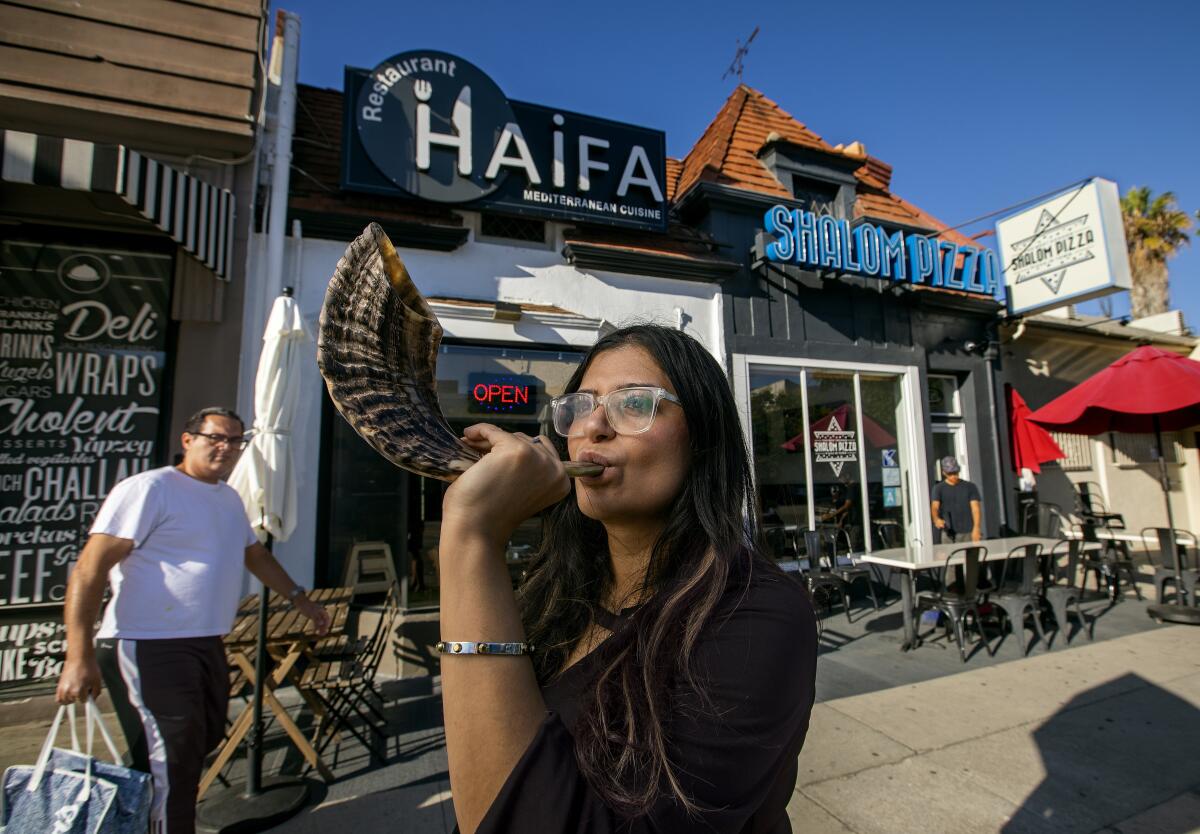
- Share via
The end of summer has long been a season of spiritual accounting for Jews like Sarah Afkami. But while her neighbors in Pico-Robertson are busy praying for forgiveness, the TV writer has an additional concern: whether she can afford to celebrate the upcoming Jewish New Year.
“I’m going to have to have a talk with my rabbi,” said Afkami, 34. “It’s been a rough summer.”
The Hollywood strikes have upended life for tens of thousands of workers in Los Angeles, leaving people of all faiths struggling to pay for food, rent and healthcare.
But in a city that is home to more Jews than Tel Aviv, the labor disputes have also upset the autumn High Holidays, a period of festive family gatherings and intense communal prayer, when many believe their fates — including their fortunes — are written for the year to come.
“I’m a child of immigrants, so there’s no generational wealth waiting for me,” Afkami said. “I’ve questioned my entire life choices.”
Although healthcare and working conditions are part of the negotiations with studios, compensation is the central issue in the strikes, with writers and actors both seeking pay bumps and more generous residuals. Most union members are not breakout stars, and many struggle to eke out an existence in one of the most expensive cities in the world.
It’s a common — and false — antisemitic trope to say that Jews run Hollywood. In reality, the film industry is diverse, and Jews work in all types of jobs, many of them not so glamorous, powerful or lucrative, as shown by the communal crisis now facing thousands of workers across Los Angeles on the eve of the autumn holiday season.
As with Eid or Lunar New Year, Rosh Hashanah is traditionally celebrated with lavish feasts and fine holiday clothes. Prayers for sustenance are part of the liturgy, alongside those for peace, long life and forgiveness. Many also have the custom to make donations for kapparot, a form of ritual atonement otherwise performed by slaughtering a chicken ahead of Yom Kippur.
But the biggest expense by far for most Jewish families is the prayer service itself, which can cost hundreds of dollars as a stand-alone ticket and many times more as part of a synagogue membership.
For the record:
8:13 a.m. Sept. 15, 2023An earlier version of this article misspelled the first name of Elana Mann of South Pasadena as Elena. It also said her children are attending religious school for free. They are receiving a steep discount.
“Most synagogues charge thousands of dollars to become members,” said Elana Mann, an artist and mother of two in South Pasadena, whose set-designer husband is out of work amid the strikes. “There’s people who are just like, ‘We can’t afford to go this year.’”
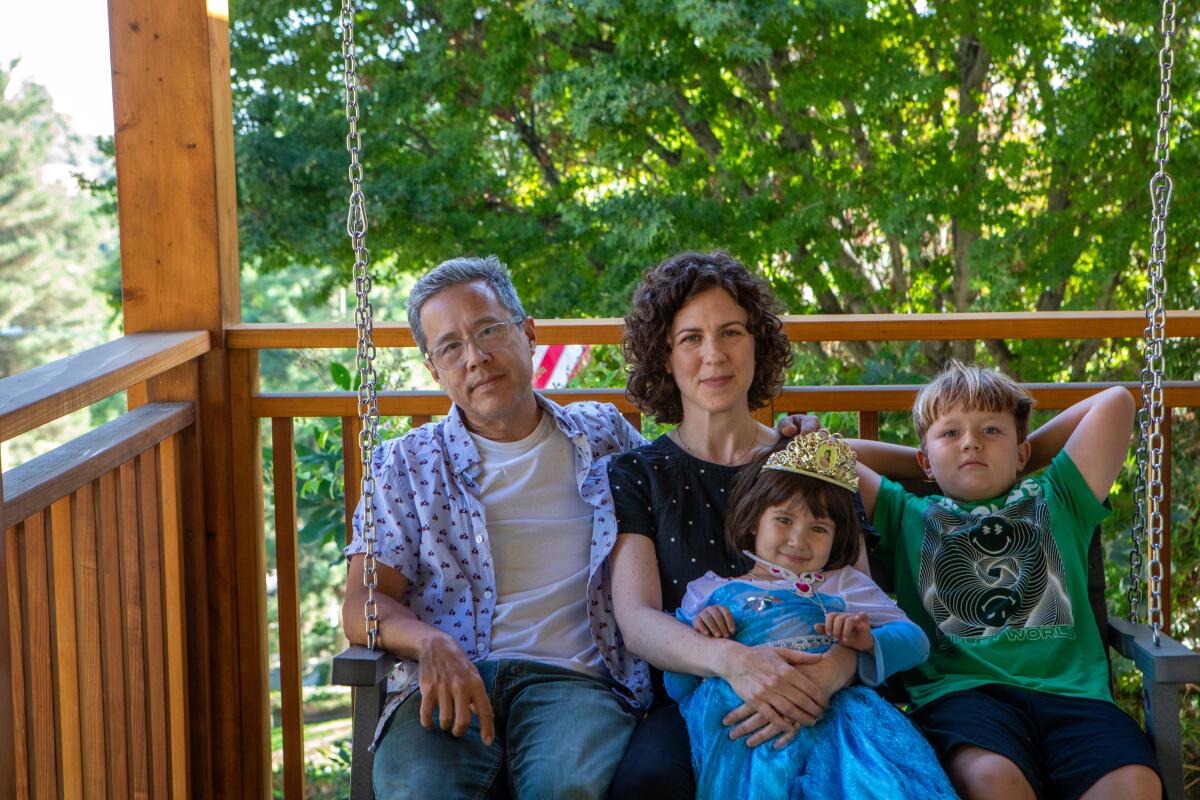
Membership for a family like Mann’s costs $3,805 at Valley Beth Shalom, a Conservative synagogue in Encino. At Temple Israel of Hollywood, a Reform congregation, it’s $3,760. And at Beth Jacob, an Orthodox shul in Beverly Hills, membership would run them $2,630 for the year.
Prices are similar at large synagogues across the state, from Southern California to the San Francisco Bay Area and throughout the Central Valley.
That puts prayer out of reach for most striking workers, even as many feel they need it more than ever.
“All they want is a place they can come and pray, even though they don’t have the means,” said Rabbi Zalman Partouche of Chabad of Hollywood, whose flock includes many writers and actors. “Specifically by the strike, they want to come and feel connected and loved.”
Chabad is a Hasidic movement whose modest synagogues are known worldwide as places to pray and eat for free on holidays and festivals. In Los Angeles alone, the sect boasts dozens of shuls, including special centers for Russian and Persian-speaking refugees.
“We’ve always helped starving writers,” said Rabbi Leibel Korf of Chabad of Greater Los Feliz. “We believe our sustenance is inscribed by God on Rosh Hashanah, so we’ll give them all the support we can.”
Amid the ongoing strikes, both rabbis have redoubled their efforts to welcome those out of work.
Frustration, fears about the future and a high degree of mistrust continue to shape the script of Hollywood’s strikes by the WGA and SAG-AFTRA.
Still, relatively few Hollywood workers feel at home in Chabad’s traditional services, where prayers are sung exclusively in Hebrew and Aramaic, and must be said out of sight by women, who worship hidden behind a screen.
Others are left out by Orthodox interpretations of religious law, which recognize only those born to Jewish mothers or converted under Orthodox supervision.
For them, L.A.’s alternative Jewish communities have emerged as a spiritual safety net.
“We’re a community of folks who haven’t always been centered in Jewish life — because they’re interfaith families or they’re queer Jews or Jews of color, or they’ve not had the financial means,” said Rabbi Susan Goldberg of Nefesh, a nondenominational congregation in Echo Park.
Most synagogues will negotiate with families who are experiencing financial hardship. But few make the process clear or easy.
“Sometimes temples ask to see your taxes,” Goldberg explained. “People can come to our High Holidays and make any amount of donation they’re able to, including nothing.”
For Mann and her interfaith family, that meant renewing their longtime membership for just $50.
“I told my parents, and they were agog,” she said. “My mom, her jaw dropped. Literally, her mouth was just opened wide. It’s totally unheard of.”
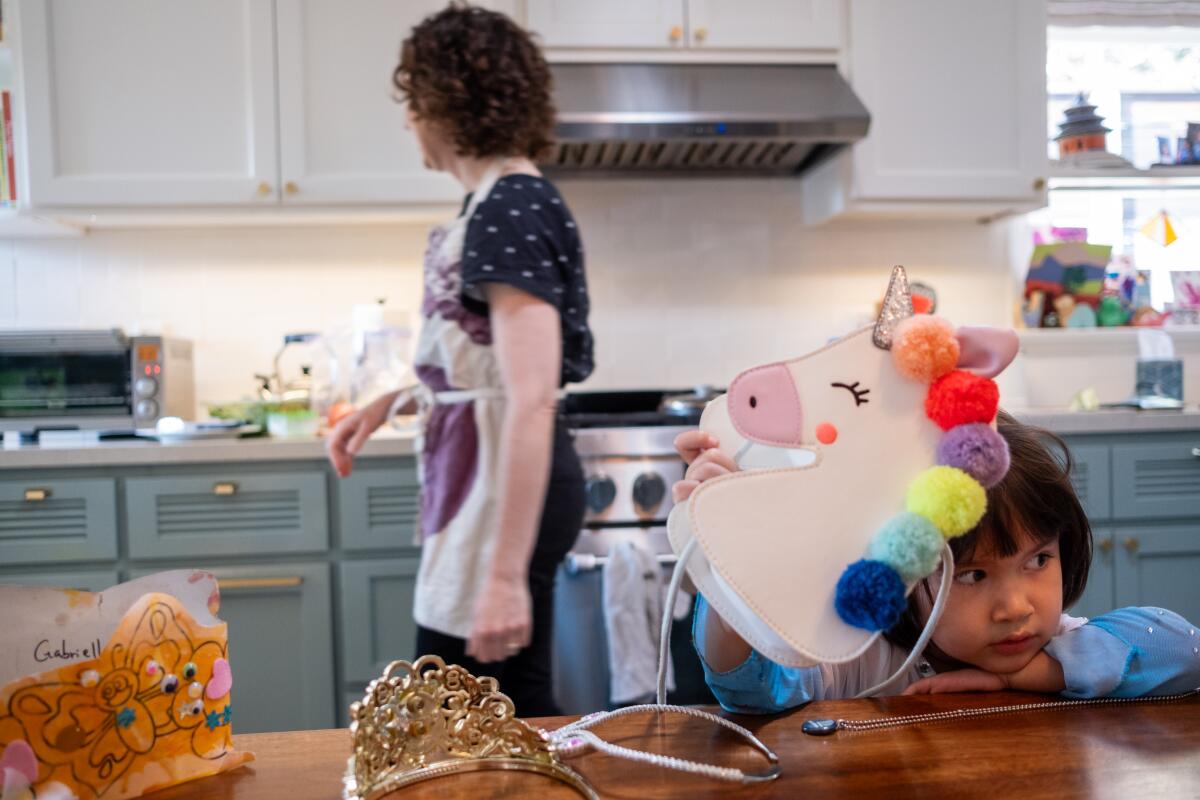
For many rabbis, the commitment to striking workers goes well beyond the pulpit. Mann’s children are now attending Nefesh’s religious school at a steep discount, and some Chabad rabbis have waived preschool tuition for those affected by the strikes. Others have arranged meal delivery and mutual aid.
“Our clergy are doing a lot more pastoral care,” said Rabbi Morris Panitz of IKAR, a large nondenominational community in Mid-City. “This is a time of year that comes with a lot of introspection: Who am I and who do I want to be in this world? Those existential questions, coupled with the tremendous uncertainty [of] the strikes, create more of a need to lean on community.”
With writers and actors on strike together for the first time in more than 60 years, even major players are offering free seats.
“This has such a ripple effect on this community,” said Rabbi David Baron of Beverly Hills Temple of the Arts, which is offering free services to members in good standing from the two striking unions. “I said we should not make spiritual connection a financial impediment during this time when people aren’t working.”
But the costs of free services are considerable, some rabbis say.
“All of this takes a lot of funds,” said Goldberg, the Nefesh rabbi. “We have to look for funding ... to support a community that’s not as well-resourced.”
The 2023 writers’ strike is over after the Writers Guild of America and the Alliance of Motion Picture and Television Producers reached a deal.
A single Torah scroll costs upward of $30,000; a single holiday prayer book $25 to $50. Smaller synagogues must pay to rent hotel ballrooms or high school gyms, and hire staff to secure them.
Most also pay at least one chazzan, a trained vocalist, to help lead the hours-long prayer service, which includes distinct High Holiday melodies that are unique to L.A.’s numerous Jewish ethnic communities and religious sects.
Avinu Malkenu, one of the most recognizable and beloved prayers of the liturgy, is sung differently by Ashkenazi Jews at Beth Jacob than by Mizrahi Jews at Nessah, and differently again at Chabad of Beverly Hills, though all three are Orthodox synagogues less than two miles from one another in the same tony enclave.
In addition to providing spiritual succor to those on strike, many rabbis have also joined the picket line themselves.
“It’s been important to both say that from the pulpit and back that up with activism,” said Panitz, the IKAR rabbi, who recently picketed with the writers guild outside Sony Studios. “Actually joining the picket was an important part of that.”
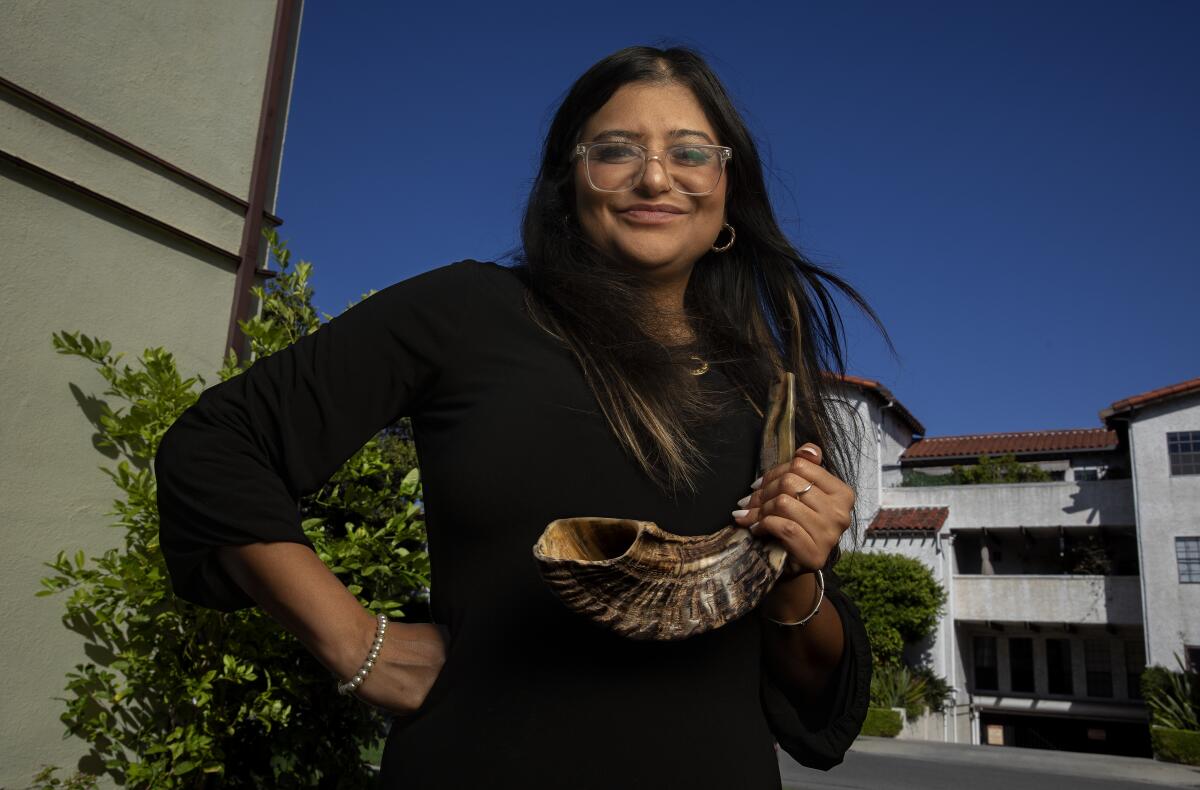
For some, like actor Melanie Ehrlich, the strike itself has become spiritually significant.
“There’s so much misery and shame wrapped up in the experience of being Jewish and not being able to afford it,” said the actor, who recently organized a Jewish-themed picket outside Netflix headquarters in Hollywood, followed by a community Shabbat meal paid for with food stamps. “The strike is just exacerbating what already exists.”
For Ehrlich, this season of spiritual accounting has also become a reckoning with the Los Angeles Jewish community, where impressive prayer services sometimes come at the cost of communal care.
“It doesn’t have to have all these trappings,” the actor said. “Just give me God.”
More to Read
Sign up for Essential California
The most important California stories and recommendations in your inbox every morning.
You may occasionally receive promotional content from the Los Angeles Times.

